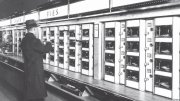A market-like notion of personal choice has come to pervade ways of thinking about everything from what flavor of ice cream to order or whom to date to the most fraught issues in political or ideological discourse. Put in perspective, this freedom-as-choice/choice-as-freedom construct is an odd, perhaps even unnatural, approach to finding one’s way in the world. How it came to be, what it means, and why it is perhaps losing altitude are the themes of the vast, original, and thought-provoking The Age of Choice: A History of Freedom in Modern Life (Princeton, $37), by Sophia Rosenfeld, Ph.D. ’96, Annenberg professor and chair of history at the University of Pennsylvania. From the introduction:
A few years ago, when I boarded a flight to Japan on Air Canada (whose slogan at the time was “Choice is good”), my own choices of the day started on a screen with hundreds of entertainment possibilities available at the touch of a finger. There was even a weepy Nicholas Sparks movie on offer called, appropriately, The Choice. The necessity of making such determinations only concluded when, after disembarking, I had successfully eaten dinner by grabbing at what I took to be the most attractive sushi options in a Tokyo restaurant as they came endlessly around a snaking conveyor belt, a menu come to life. The business of selecting and the logic of the menu of options have become both a way of life and, it is widely assumed, a means to build a life—or what we now call a “lifestyle.”
For choices, from this vantage point, not only help each of us get what we want. We are the sum of our choices. (Even opting out, like Herman Melville’s Bartleby the Scrivener, has come to represent one among many possible choices about how we want to live and who we want to be.) Although we rarely make up the rules of the game or craft the banquet of possibilities, we like to think that when we are expressing our personal preferences, we are engaged in the business of self-realization as distinctive and independent people. Both having choices and making choices are largely what count these days as being, indeed feeling, free.
This conception of the self, and even more of freedom, spans the political spectrum in the contemporary United States. It forms the basis of what the sociologist Pierre Bourdieu once called a doxa, the set of largely taken-for-granted assumptions that undergird all explicit fights in a given era. Consider “reproductive choice” on the left and “school choice”…on the right. One reason for this recurrent rhetoric is that few Americans today see themselves as opposed to the maximization of either alternatives from which to make selections or occasions to do so. We generally only disagree about what those alternatives are supposed to be.









